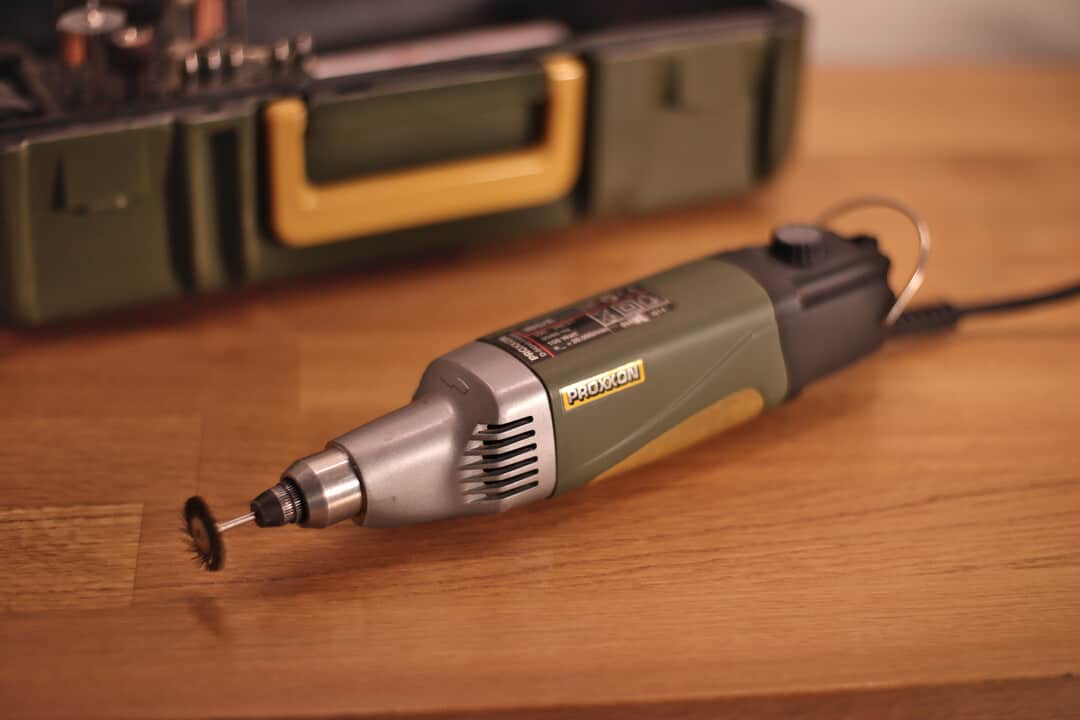Rotary multitools are a very useful and versatile tool type for small and detailed cutting, grinding, milling and drilling jobs. Although Dremel rules the rotary multitool market, there is an upmarket alternative from the German manufacturer Proxxon: the IBS/E Professional Rotary Tool. But is Proxxon worth the “Professional” title and the extra tens of dollars?
In this article, I am going to share my opinion on this based on my six years of using the IBS/E. In short, the Proxxon IBS/E Rotary Tool is well-built, stable, quiet and comfortable compared to the competition. It also mounts well to a drill stand. The Proxxon is well worth the extra cost in long-hours or long-term use in precision tasks. The slower tool change mechanism and lower power make it suboptimal for quick and rough work.
Next, we are going to start by looking at the claimed specs and features of the IBS/E and see how they match with the competition, after which I will give you my take on the Proxxon. I hope this review will help you decide whether you should invest in this tool.
Review summary
| Property: | Grade: |
|---|---|
| Build quality: Power: Stability: Grip: Tool change: Use with stand: Reliability: Accessories: | +++ (3/3) +++ (2/3) +++ (3/3) +++ (2/3) +++ (1/3) +++ (3/3) +++ (2/3) +++ (2/3) |
| Benefits: + low vibration levels + quiet + decent torque + machine collar | Drawbacks: – high price – limited peak RPM – slow tool change |
Workshoppist.com is an Amazon Associate. As an Amazon Associate we earn from qualifying purchases.
Main specs
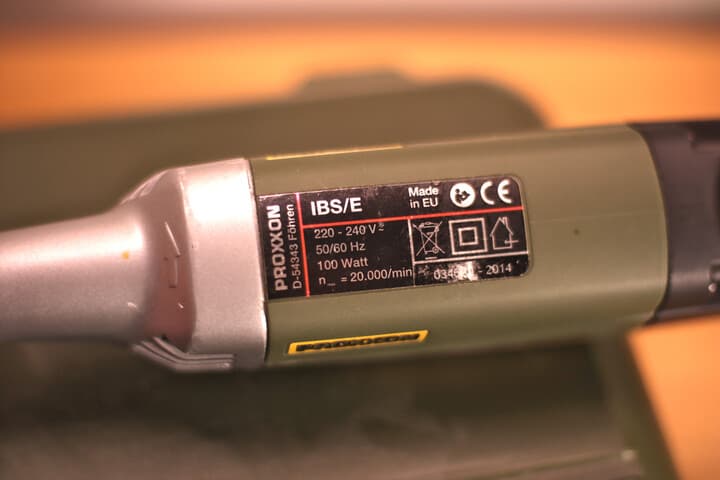
Let us start by looking at the IBS/E in terms of main specs, and comparing them to the obvious competition – the corded Dremels 3000 and 4300.
The table below shows the nominal power, RPM range, length and weight of the three rotary tools. The key points are:
- Proxxon IBS/E has much lower peak RPM than the Dremels
- The Proxxon has lower peak power
- Proxxon is the lightest of the three
| Property | Proxxon IBS/E | Dremel 3000 | Dremel 4300 |
|---|---|---|---|
| Power: | 0.9 A (100W) | 1.2A (130W) | 1.8A (175W) |
| RPM: | 5k…20k | 5k…35k | 5k…35k |
| Length: | 9” (230 mm) | 7.5” (190 mm) | 9” (230 mm) |
| Weight: | 1.1 lb (500 g) | 1.2 lb (550 g) | 1.5 lb (660 g) |
In this comparison, the Proxxon appears as a tool for lighter duty than the two popular Dremels. However, focusing only on peak power and RPM is misleading, as the peak RPMs are typically used only with very small-diameter bits and at relatively low loads.
Instead, the biggest challenge on the rotary tool motors is usually heavy grinding and cutting with large bits at low-to-medium RPMs. To avoid stalling, what is critical is a high torque output, not so much speed or peak power.
While torque specs are not reported by rotary tool manufacturers, they can be inferred roughly from the published max power and RPM. As the Proxxon IBS/E achieves a decent peak power output and must do so at a much lower speed than the Dremels, the IBS/E probably has low-RPM torque output similar to that of the Dremels.
This means that the Proxxon will probably deliver similar low-to medium RPM performance in a lighter package, although the Dremels will have an advantage with small bits at high RPMs.
Special features
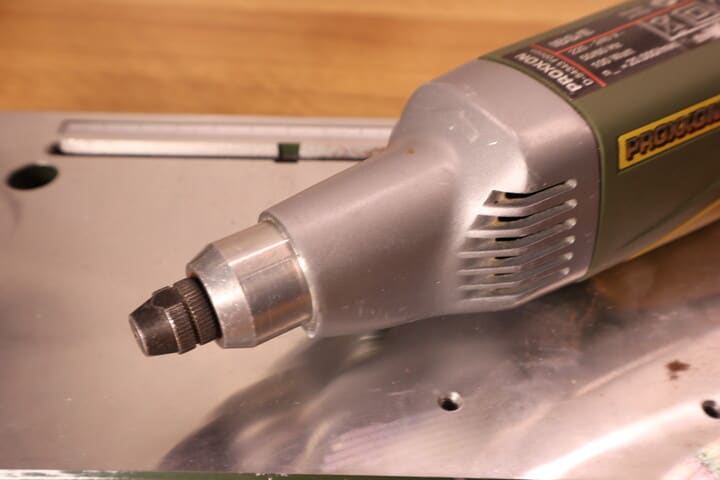
The Proxxon IBS/E departs from other rotary tools in many construction features which are worth mentioning. The most important selling points of the tool that are emphasized by the manufacturer are:
- Die-cast head: The IBS/E housing features a plain black plastic rear end cap with control knobs, an understated two-component mid section for gripping and a solid cast aluminum head. Compared to the all-plastic housing of most competitors, the aluminum head should help to reduce runout and vibration and improve accuracy and heat dissipation.
- Machine collar: Exceptionally for rotary tools, the metal head also features a cylindrical machine collar (D = 20 mm or .787”). This should allow a very stiff attachment to of the tool to Proxxon stands and tool holders.
- Precision spindle: Proxxon IBS/E boasts a “ground steel spindle” and “ball bearing assembly” in its specifications. Although neither of these are apparent to the user (unless you go and disassemble the tool), they probably help the tool to achieve its low claimed runout and low vibration levels.
- Precision chuck: Proxxon employs a collet chuck with that comes with hardened three-slit “high-concentricity” collets in six sizes between 1/32”…1/8”. The bits are tightened into the chuck using an included key after locking the spindle with a push-button.
My impression
Build quality: +++
The Proxxon’s promise of quality and professionalism is made visual by the tool housing, where the appearance and build of the Proxxon IBS/E stand in contrast to the more plastic construction of most of the competition.
Everything in the tool gives an impression of quality: the aluminum head feels very solid, the mid-body is clean and grippy and the switch and knob in the tail housing appear robust. The spindle locking mechanism also appears durable just as the power cord, which is proper rubber cable as in most professional corded power tools.
Apart from the optics, many of these details undoubtedly contribute to the performance and longevity of tool – my six years of use have barely left a mark on it.
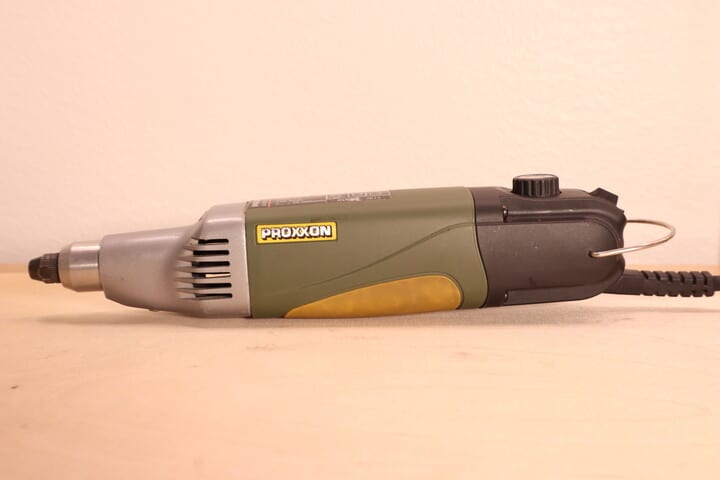
Power: +++
Despite the low specifications, the Proxxon IBS/E has proven powerful enough for my use.
Its heaviest and also most frequent task has been cutting small screws to length with a 1-½” Dremel cutoff wheel. Sure, the motor will stall if pressed too hard, but so will any small rotary tool; if you stick to reasonable feedrates, the cutting is efficient and fast enough.
Admittedly, more power would not hurt: you could use larger bits and remove material faster. For its size and weight, however, the Proxxon performs just fine.
Stability: +++
Stability is where the Proxxon IBS/E really excels. The effort the manufacturer has put into spindle supporting and balancing and chuck precision clearly shows: the IBS/E runs smooth and without any noticeable vibration through its entire RPM range.
The IBS/E is also amazingly quiet compared to much of the competition, so much so that even at 20.000 RPM, I do not instantly get the impulse to reach for my ear defenders.
The low vibration and noise level translate to both user comfort and work precision: the tool does not feel bouncy and is easy to hold stable without numbness or hand fatigue even for longer periods of time. This effect is amplified by psychology, as the quiet and stable tool helps you to relax and concentrate – something that is absolutely essential in much of the precision work you would use such a tool for.
Grip: +++
The working grips the Proxxon IBS/E offers to the user is quite different from the competition: instead of the typical rubberized neck and flange, the IBS/E tool frame ends in the smooth 20 mm machine collar that sits right at the end of the tool head.
This grip is something that naturally divides opinion. Personally, I like it: having a slender section very close to the chuck allows you to grip the IBS/E pretty much as you would grip a pen, which is great in precision work like engraving. In heavier work, however, some users may legitimately be worried about their fingers slipping from the smooth collar onto the chuck and miss the security the more standard rubberized neck offers.
Fortunately, the IBS/E has a second purpose-made grip in the two-component midbody, which partly makes up for the deficiencies of the first gripping spot. This second grip in the mid-body is wide enough to be grabbed with the whole hand and gives you plenty of leverage when grinding. Being further off from the actual cutting point, however, it does not offer very precise control over the tool tip motion.
I have myself found two working styles with the IBS/E:
- For precision work, I hold the machine collar with my fingers like a pen
- For rougher work, I grab the tool midbody with my right hand, and steer the tip with my left hand
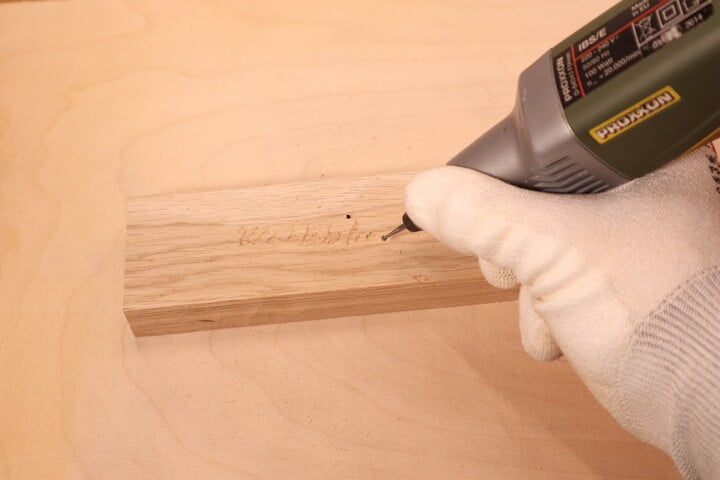
This combination has served me well, and have not yet felt the need to invest into a flex shaft attachment.
Tool change: +++
While the collet chuck system of the Proxxon IBS/E undoubtedly contributes to the smooth and precise running, I must admit that the collet chuck makes tool changes a bit more tedious than I would prefer.
Changing bits with the same shaft diameter is relatively OK: it requires you to use the chuck wrench twice, but this is just the same as with all other keyed chucks.
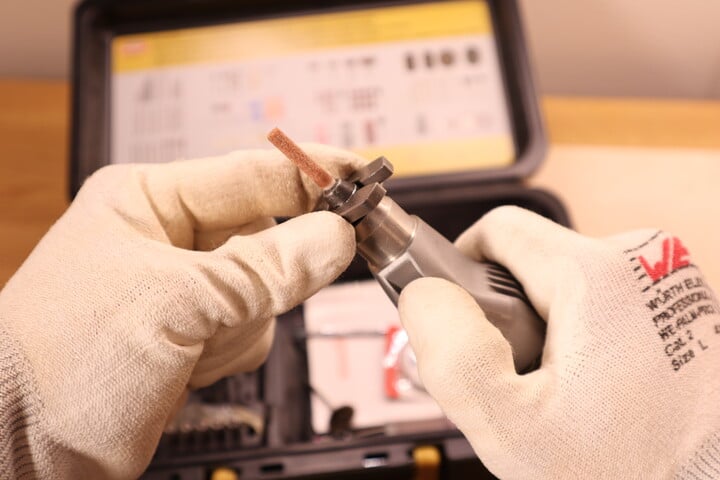
Changing between shaft diameters, however, requires changing the collet and involves much more work: you lock the spindle, loosen the chuck with the wrench, spin it all the way out with your fingers, remove the collet, find the one that fits your new shaft, insert, spin the chuck back and tighten with wrench. The process is not difficult, but typically takes between 30 and 60 seconds to complete, so that having to go back and forth in rapid succession becomes very annoying.
And going back and forth between different shaft sizes is almost unavoidable, particularly if you use both Dremel and Proxxon accessories: Dremel favors the 1/8” shaft, while the Proxxon bit sets are more tilted towards 3/32” shaft.
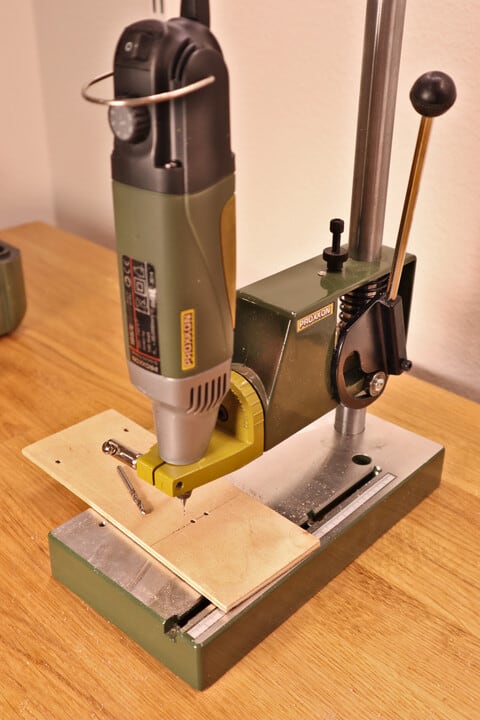
Use with stand: +++
The 4/5 in. (20 mm) machine collar of the Proxxon IBS/E allows the tool to be mounted to the MB 140/S or MB 200 drill stands (link to Amazon). The collar provides an excellent rigid mount point close to the bit, minimizing all wobble and vibrations.
A rigid stand mount is really useful when you need to go exactly straight, either down when drilling or to the side when milling.
I have found the IBS/E on a drill stand immensely helpful also in making deep cuts with the thin cutoff wheels. Handheld, the cutoff wheel tends to rotate the tool, bind in the deep groove and splinter. Mounted on a stand, the stiffness of the stand prevents the initial rotation and thus also the binding and splintering. This technique has allowed me to use the thinnest cutting wheels in cutting machine screws, springs and even small pipes, all without a single broken wheel!
Reliability: +++
In my personal use, the Proxxon IBS/E rotary tool has proven very reliable, and been completely trouble- and service-free. After six years of intermittent use, it shows no signs of wear, apart from some completely cosmetic issues.
Two things stop me from giving it a full +++ grade in reliability:
- The tool heats up during heavier grinding, and has started to smell ominously like burned plastic after some of the heaviest bouts. While the use was perhaps heavier than a rotary tool is intended for and just a smell is not a failure as such, it is a slightly negative indication.
- Other users have reported their tools dying much sooner than expected from a premium tool. Although I have no personal experience of such a failure, these user reports give some indication of possible quality issues, either past or present.
Accessories: +++
Proxxon makes a number of stands, holders and extension shafts for the IBS/E. My experience is that the Proxxon accessories are all useful and well made just like the tool.
However, Proxxon’s accessory selection is much narrower than Dremel’s. With bits, I recommend to get a Dremel kit instead of the original: they are compatible, have better availability and price.
I have listed the main accessories in the table below. The table includes links to Amazon (Workshoppist.com is an Amazon Associate. As an Amazon Associate we earn from qualifying purchases.)
| PROXXON IBS/E | Model name* | Part number |
|---|---|---|
| Tool body: | IBS/E | 38481 |
| Drill stand: Universal holder: Flex shaft (collet): Flex shaft (chuck): Tool kit (Dremel): | MB 200 UHZ 110/P 110/BF 710-08 | 28600 28610 28620 28622 |
| *(links to Amazon) |
Price
The premium quality and construction of the Proxxon IBS/E rotary tool come at a premium price point. Retailing typically above $100 as a minimal kit, the IBS/E is almost twice the price of similar tools from other name-brand manufacturers such as Dremel (check current price at Amazon).
Put in an another way, the price of the IBS/E buys you a more powerful tool or a cordless model – and an extensive accessory set included.
So is the IBS/E worth this price premium? This is a question you will eventually have to assess based on your work profile and budget. However, I would venture to say this: if your workflow involves long periods of very precise engraving, grinding or drilling, or if you want to drill or mill using a stand, I think the stability and smooth running of this tool are worth the price premium.
Conclusion
Looking at the whole, the small rotary tool by Proxxon has lived up to my expectations. It was not particularly light on my wallet – not at least after including all the accessories – but worth the money.
To summarize, the Proxxon IBS/E is a rotary tool of exceptional build quality and some unique features; although not the most powerful tool on the market, it fully delivers on its promise of stability and precision.
To summarize, the Proxxon IBS/E is a rotary tool of exceptional build quality and some unique features; although not the most powerful tool on the market, it fully delivers on its promise of stability and precision.
I hope my review will be helpful to you in deciding whether the IBS/E is the right tool for you, and I wish you best success in your detailing work!
Q&A
Is Proxxon better than Dremel?
In my opinion, the Proxxon IBS/E rotary multitool is better for precision work, while the Dremels for are better quick and rough cutting and grinding.
The Proxxon is stabler, quieter and more precise than Dremel rotary multitools, but Dremels are quicker to use with the SpeedClic tools and typically have more power.
Are Proxxon and Dremel tool bits interchangeable?
Yes. Both Proxxons and Dremels use plain shank tools and come with a set of collets for different diameter shanks. This is particularly good for Proxxon, since Dremel bits have better availability and IMO give more bang for your buck. The Dremel SpeedClic quick change tool holders also work with Proxxon.
